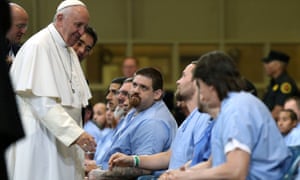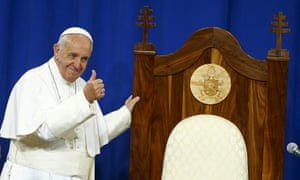"x x x.
Pope Francis has urged inmates at a Philadelphia jail to believe in the power of rehabilitation, condemning societies that normalize their suffering, on the last day of his trip to a nation that holds one-fifth of all the world’s prisoners.
Speaking at Curran-Fromhold correctional facility, the Argentinian pontiff told a group of 60 male and 11 female prisoners: “Any society, any family that cannot share or take seriously the pain of its children, and views that pain as something normal or expected, is a society condemned to remain hostage to itself, prey to the very things which cause that pain.”
He urged the inmates, their families and the correctional officers to believe in the possibility of rehabilitation, saying Christ “comes to save us from the lie that says no one can change”. They should regard their time in prison not as exclusion from society but as a period aimed at giving them “a hand in getting back on the right road”, he said. “All of us,” he added, “are part of that effort.”
Francis said: “It is painful when we see prison systems which are not concerned to care for wounds, to soothe pain, to offer new possibilities,” he said. “It is painful when we see people who think that only others need to be cleansed, purified, and do not recognize that their weariness, pain and wounds are also the weariness, pain and wounds of society.”
His words were welcomed by prison reform campaigners. “The pope is removing the stigma of these issues,” said Holly Harris, executive director of the Justice Action Network, a pro-reform group. “We’re no longer talking about an obscure minority of people – this is something that impacts everyone in America. When you’re sitting in church this morning and look to your left and your right, odds are one of those people has a criminal record.”
The pontiff spoke at length about washing the feet of prisoners, something he has done every year since his election in 2013. “Life means ‘getting our feet dirty’ from the dust-filled roads of life and history,” he said. Christ “washes our feet so
He also expressed solidarity with the inmates, twirling a finger in a circle: “All of us have something we need to be cleansed of or purified from. All of us.”
The pope spent several minutes chatting and shaking hands with each inmate, and said a chair that a few of them had carved for him was “beautiful”.
Inmates were chosen to meet the pope from among those who identified as Catholic, and then through recommendations from administrators, chapel staffers and social services, prison spokesperson Shawn Hawes told the Guardian. Some of the prisoners came from the nearby Riverside Correctional Facility, the female counterpart to the all-male Curran-Fromhold.
Harris praised the pope in particular for addressing prisoners’ re-entry into society. “We’ve got to remember we’re trying to return better citizens, not people who can’t find work or housing and end up turning to crime again.”
Since becoming pope, Francis has washed the feet of inmates every spring, including, for the first time, women, in 2013. Earlier this summer he visited a Bolivian prison notorious for violence and corruption.
As at the five other jails in Philadelphia, inmates and advocates have accused Curran-Fromhold of overcrowding, unhealthy conditions, inadequate mental health services and repeatedinfractions by guards. A guard who beat an inmate – and was caught by a security camera – resigned on Thursday. The system currently imprisons about 1,700 more people than its jails were built to hold, a microcosm of the woes of mass incarceration. Pope Francis greets inmates during his visit to Curran-Fromhold correctional facility. Photograph: David Maialetti/AP
Pope Francis greets inmates during his visit to Curran-Fromhold correctional facility. Photograph: David Maialetti/AP
 Pope Francis greets inmates during his visit to Curran-Fromhold correctional facility. Photograph: David Maialetti/AP
Pope Francis greets inmates during his visit to Curran-Fromhold correctional facility. Photograph: David Maialetti/APNationally, the US prison population has swelled over several decades to a total of 2.2 million people, about 20% of all the world’s incarcerated people. One in three Americans have a criminal record, which can prevent them from keeping their family together and finding housing and work – the major themes of Pope Francis’s improvised and prepared addresseson Saturday night.
Curran-Fromhold also highlights a peculiarity of the US’s manifold and often punitive bail systems – an estimated 80% of its 2,800 inmates have not yet been convicted of the crimesfor which they’re imprisoned. Bail reform is a priority for several groups, including an initiative by the MacArthur Foundation that hopes to reduce prison populations in 20 jurisdictions, including Philadelphia.
Laurie Garduque, director of justice reform for the MacArthur Foundation, told the Guardian that she hoped the pope’s visit would highlight the “unusual moment” of bipartisan will to overhaul the justice system in the US.
“There are so many stakeholders at so many levels in this system: the police, the prosecutor, the defender, the courts, the mayor,” she said, “and they’re run different in each jurisdiction. But there are so many reasons to want to make change, too, and not just the billions of dollars. These are human lives and their families at stake.”
x x x."
